CAMFED Tanzania's Anna Sawaki and Stumai Kaguna reflect on 10 years of CAMFED programs funded through UK Aid, and explain what a sustainable, scalable model for educating the most vulnerable can look like.
Confidence, courage, compassion, collaboration: How girls’ education is boosting a sisterhood of game changers
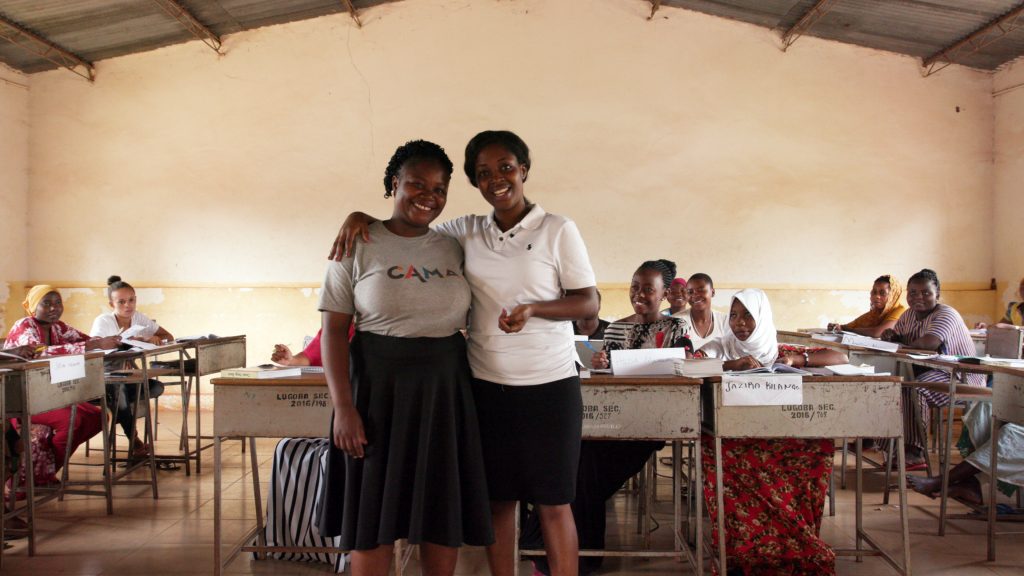
Stumai (left) with fellow CAMFED Association leader Diris, as they coordinate a training session for school graduates. (Credit: Eliza Powell/CAMFED)
More than 277,000 girls and young women have seen a tangible difference in their lives as a result of two CAMFED projects implemented under UK Aid funded Girls’ Education Challenge – Transitions (GEC-T) in peri-urban and rural districts of Tanzania, and rural districts of Zambia and Zimbabwe. Both projects centered on the introduction and scaling of CAMFED’s Learner Guide program, now at the core of CAMFED’s work. The impact achieved is a culmination of nine years of work and investment under the Girls’ Education Challenge, which – for CAMFED – began in 2013 and ended in January 2022. The projects were central to developing and delivering CAMFED’s wider organisational strategy, and served as a powerful demonstration of its collective ability to respond quickly and effectively to the additional challenges of the COVID-19 pandemic. In this blog, Anna Sawaki, CAMFED Tanzania’s Program Manager, Development, and Stumai Kaguna, former CAMFED Tanzania client, Learner Guide, and now District Program Coordinator, explain what they’ve learned, and what a sustainable, scalable model for educating the most vulnerable can look like.
“I have seen first hand the transformation of girls’ lives”
Stumai Kaguna, Former CAMFED client and now District Program Coordinator
I am sitting in CAMFED’s office in Dar es Salaam, with Stumai zooming from Morogoro rural District in Tanzania. She had to turn her camera off, because her internet isn’t very strong, but I’m delighted that she could join me as we look back over a decade that has changed the lives of more than 277,000 young women in Tanzania, Zambia and Zimbabwe thanks to investment under the Girls’ Education Challenge (GEC) funded through UK Aid.
I’m speaking to Stumai today because she is a shining example of what I hoped we would achieve through GEC and what that transformation looks like: her experience, insights and expertise have helped us on this incredible journey to get girls into school, keep them there, help them to learn, support them to succeed and unlock their power to lead.
For others to understand the context in which we work, I ask Stumai to describe her family background, and the challenges she faced. Stumai grew up in a marginalized rural community typical of the ones CAMFED serves, where families lack the financial resources to educate all their children, and a dearth of educational and economic opportunities, especially for women, feeds the cycle of poverty.
“Life was extremely challenging,” Stumai explains. “I am the fifth-born in my family, and lost my father when I was just three years old. My mother lives with a disability, and in order for me to be able to go to primary school, she sent me to live with relatives. But once I finished primary school and got a place at secondary school, where costs increased a lot, my relatives did not have the funds to support me. So I moved back in with my mum. The village Chairperson was aware of our plight, and told my mum that she had to make sure she enrolled me at school so he could then rally financial support for me. He advised her to sell whatever she had to cover the fees for the first term. So mum sacrificed the only thing worth selling – a stack of corrugated iron sheets that she had been saving to build a better house for the family one day.”
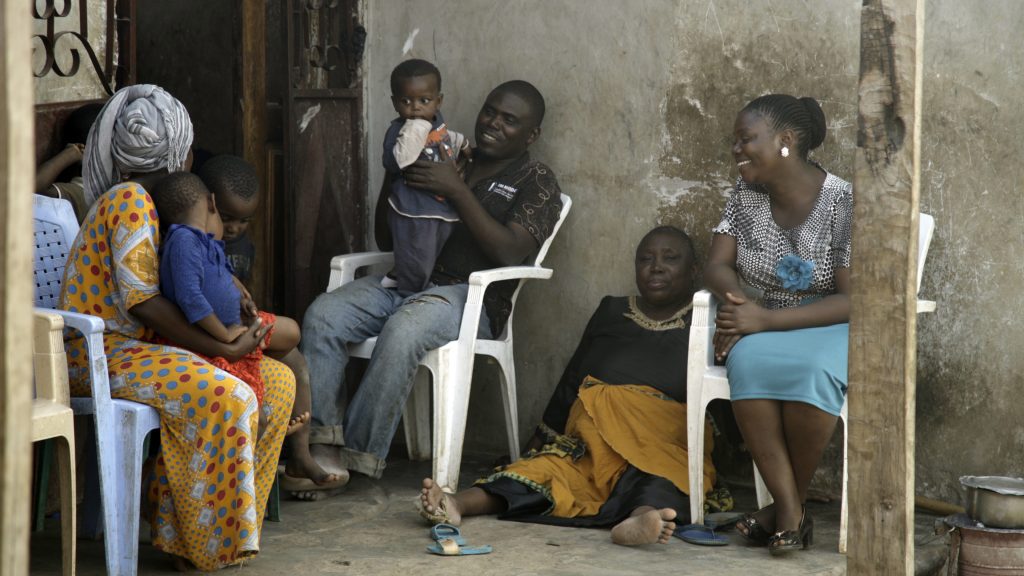
Stumai today – a confident, educated young woman – sits with her family outside her homestead. (Credit: WISE)
It was through her CAMFED-trained Teacher Mentor, Madame Mlilimko, that Stumai ended up on a list of students suggested for CAMFED support by the Community Development Committee, comprised of local stakeholders, including the village head.
Stumai’s school days were daunting. Her mum had been selling a locally brewed drink to make ends meet, but this became untenable given her disability. So Stumai convinced her to set up a home-based restaurant, and took on the job of setting up and preparing the food before she went to school every day, so her mother just had to serve it to customers. This meant getting up at 4 a.m. every morning. Just after 6 a.m., she’d start her 45-minute walk to school. Finding the time to study was hard, but Stumai was determined, because the support had opened up the door to a different future. “Before CAMFED came, I couldn’t imagine my future,” she told me. “It was a nightmare because my mother had nothing left to sell, so I had no idea where to get the school fees. Getting that support led me to see a future where I could provide for my mother and the rest of my family.”
My education was just the beginning. It was the support I received after school that brought transformation to my community.
“My education was just the beginning. It was the support I received after school that brought transformation to my community, ” Stumai tells me. When she completed lower secondary school, Stumai joined the CAMFED Association of women leaders educated with CAMFED support. “This is more than an Association, it’s a sisterhood network, it’s a learning network. We learn and empower each other, discuss and take matters forward. We grow in strength when we hear each others’ stories,” she explains. At one of their meetings, Stumai found out about CAMFED’s newly-introduced Learner Guide Program, which focuses on improving girls’ access to and retention in secondary education and equipping them with a broad set of life skills necessary to transition to productive, fulfilling livelihoods.
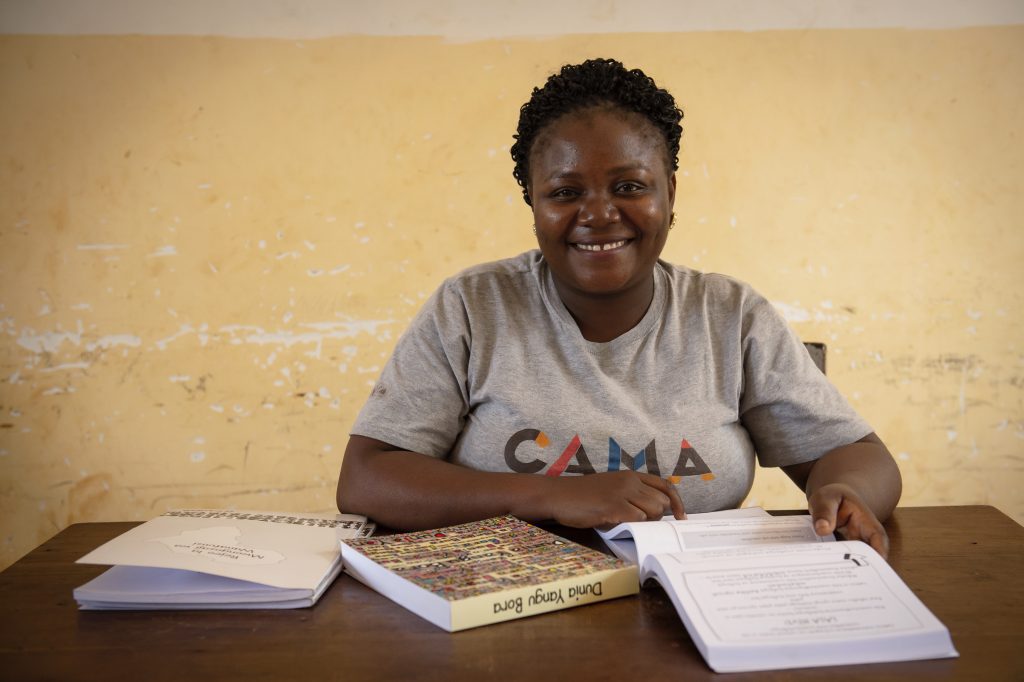
After completing secondary school, Stumai trained as a Learner Guide to deliver CAMFED’s My Better World self-development curriculum to students. (Credit: Eliza Powell/CAMFED)
Learner Guides are women once themselves supported through school, who bring their lived experience and determination to ease the journey for the girls coming behind them, offering the mentoring and social support so critical for students from disadvantaged backgrounds — both girls and boys. Stumai grasped the opportunity to train as a Learner Guide, absorbing the My Better World curriculum, which was developed by CAMFED and Pearson with young people in Africa as part of our first GEC project. The accompanying interactive workbook tells stories that rural children recognize from their own lives, teaches them about their ‘powers,’ and how to live well and do well.
Life skills lessons are key to preventing early pregnancy, early marriage, and school drop-out.
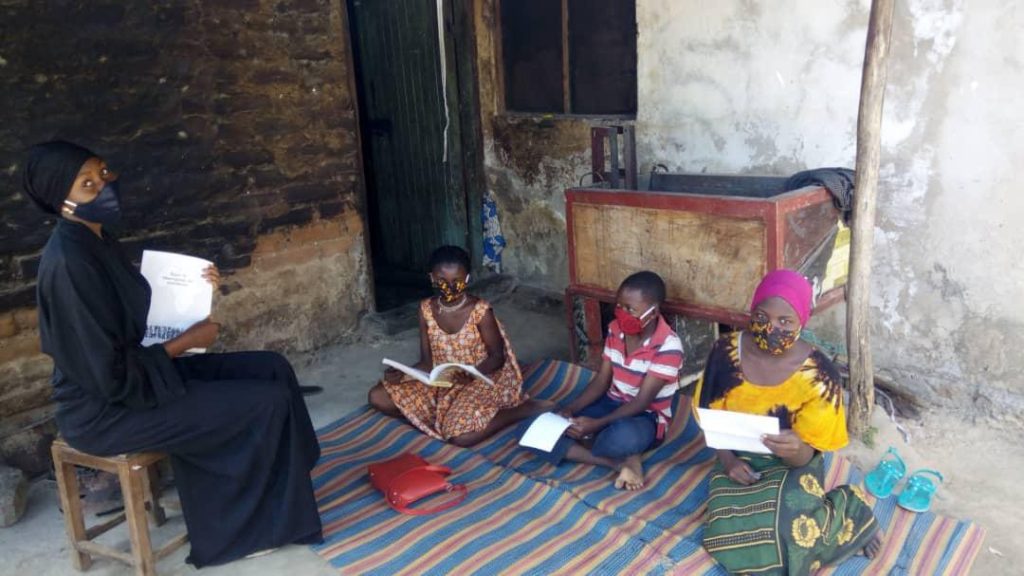
During school closures, Learner Guides like Johari (left) and Jumila (right) reached students virtually through WhatsApp groups and radio, and via socially-distanced home visits. (Credit: CAMFED)
Volunteering as a Learner Guide from 2014 to 2016, Stumai reached around 400 students, with lessons initially delivered to Form 3 and Form 4 students, so that the program’s impact could also be measured in improved exam results.(1) She says the confidence it instils in marginalized girls, combining practical information with mentorship from female role models, has a direct impact on how they perform in other lessons and in exams – because they develop the courage to ask questions, and the motivation to keep learning. Research by the University of Cambridge revealed an unprecedented uplift in learning outcomes — measured in Maths and English exam scores — among marginalized girls as a result of CAMFED’s multidimensional programs, with the role of the Learner Guide being pivotal to their success.(2)
Stumai speaks of her pride in the students she has supported – not just with life skills but with business skills – who have gone on to establish viable enterprises that help them earn an income and become independent. She organizes training sessions for students, parents and community leaders, teaching practical skills that can be applied to income generating projects, such as the production of liquid soap and financial literacy training. In sharing her knowledge, she has been the catalyst sparking improved living conditions for families in her community, and parents are able to support their children to stay in school.
One of many examples is a young woman called Asia, whom Stumai started mentoring and supporting while she was still in school, and who attended her soap-making lessons. Asia now runs a business making and selling liquid and bar soap, which served her especially well during the COVID-19 pandemic. Stumai has continued to check in on her, impressed how she managed to navigate turbulent times and stay in business. “I am proud to see the change in students, and knowing that I contributed to that. Because of this, I have gained a lot of respect both in and outside of the school,” she says.
“Stumai respects herself, works hard, consults us, and always thinks beyond herself.”
Juma Selemani Mgunda, Village Chairperson
Learner Guides like Stumai earn deep respect in schools and communities through the combination of leadership skills, confidence and activism instilled in them by their training, and the hardships they have navigated.

Stumai conducts a My Better World session at a school in Morogoro, Tanzania. (Credit: WISE)
These attributes made Stumai the driving force behind a school meal program at her village primary school. She remembers: “When I visited the school, I saw that children were dropping out due to hunger, and the long distances between their homes and the school, which was unable to provide food. So I met with my village Chairperson, Juma Selemani Mgunda, and asked him to call a meeting, inviting the local parents and teachers to attend.” Knowing first hand how difficult it can be to perform well at school in the face of consistent hunger, Stumai led the discussion to coordinate a meal program, supporting the parents in planning how they would come together to provide produce from their farms and cook breakfast for hungry learners.
Mr. Mgunda, who sat on the committee that selected Stumai for CAMFED support, was extraordinarily proud. He told us: “Stumai respects herself, works hard, consults us, and always thinks beyond herself. I have observed Stumai climb out of poverty, complete her education, and return to her community to help others like her.” He explained that thanks to her, primary school students are being fed at school, can concentrate better in class, and there have been noticeable improvements in students’ motivation and attendance.
I have reached thousands of people in my district.
Beyond the classroom, Learner Guides like Stumai create home-school links, work with traditional leaders, district and regional education officials, as well as social services, magistrates and the police in their determination to protect vulnerable children and keep them learning.
Stumai regularly conducted home visits, checking on children who had missed class and speaking to parents about the importance of girls’ education. “I have probably reached thousands of people in my district,” Stumai says as I ask her about her impact beyond the school gates. During her time as a Learner Guide, she met with about 50 students and parents outside of the classroom. Her work put her in touch with around 50 village leaders, whom she spoke to one-on-one, as well as being invited to address village and ward meetings, with each meeting consisting of 80-150 community members.
I am showing the community that everything is possible.
One important lesson we learned early on is that the need to address girls’ financial challenges doesn’t end when they graduate from school. The lack of jobs and prospects for young women continues to make them vulnerable to early marriage or exploitative labour. That’s why CAMFED’s Learner Guide program capacitates the young women themselves at the same time as serving the needs of students: In return for their volunteer work, Learner Guides can access small interest-free loans, training, connections and mentorship to grow local businesses. The boost from the GEC Transitions program, which recognized this crucial investment in educated young women, was key to growing our peer support programs and partnerships with vocational and certification bodies. It allowed young women to start and grow group businesses, earn a BTEC qualification for being a Guide, and train as peer Guides, working beyond the classroom as “Transition Guides.”
This post-school support allowed Stumai, for example, to slowly build up three income-generating ventures: a small clothing boutique, a retail shop attached to her mother’s house — selling essentials like maize flour, cooking oil, salt and water — and a thriving motorcycle taxi business. She owns five motorbikes and employs five drivers, as well as two other people to run the boutique and shop. “Owning a business, for a girl like me, at my age, is unusual in my community. But I am showing the community that everything is possible,” she told us when she’d set up her motorcycle taxi business more than five years ago.
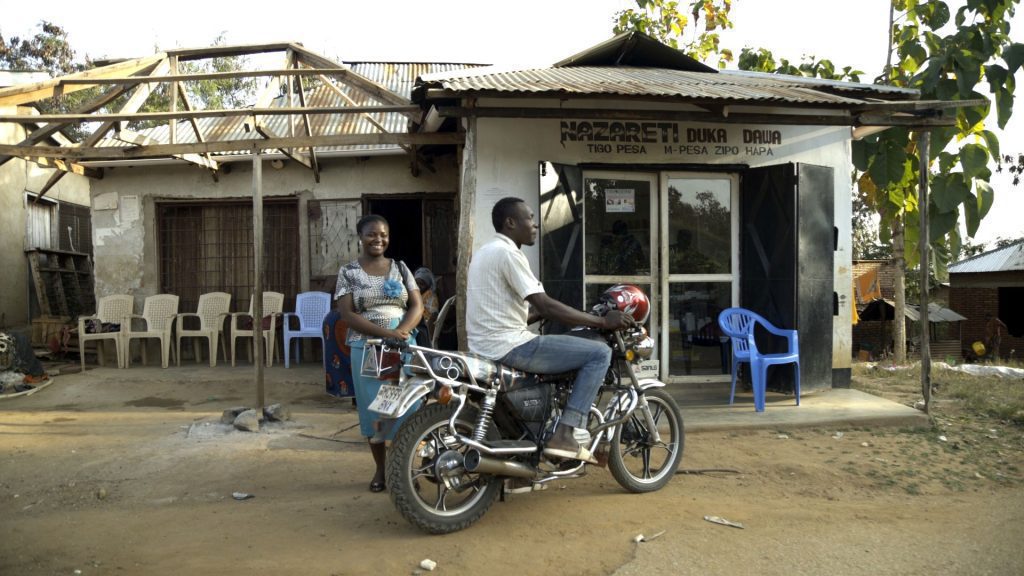
Stumai stands proudly outside her successful motorcycle taxi business, one of three businesses she has launched since taking part in CAMFED supported business skills training. (Credit: WISE)
Confidence is everything.
The word most often spoken by girls and young women impacted by the programs CAMFED’s developed under the GEC is ‘confidence.’ It’s not easy for young women from marginalized backgrounds to develop a sense of self-worth and build up the confidence to stand up for themselves, speak in front of others, ask questions, and seize opportunities. “Confidence is everything,” Stumai says to me when I comment on the influence she now wields. “If you have confidence, you can try anything – through confidence, you will be able to engage. You may have a lot of knowledge, but If you don’t have confidence, you won’t be able to communicate. Confidence will take you where you want to be. Through confidence, I have been able to start my own businesses, tell my story without fear, confident as a survivor; I am able to communicate at different levels: at community level, district level, national level. I’m not afraid to say the Stumai you knew years back is different now – I have changed, I am proud.”
I am a role model. The students always look at me and say, ‘I want to be like you.’
Students supported by Learner Guides grow in confidence earlier, Stumai says, because they not only learn the skills, they have that role model – someone to look up to. What Stumai says next, I have heard from hundreds of other Guides in the CAMFED Association, “I am a role model. The students always look at me and say, ‘I want to be like you; I want to have your confidence.'”
Like Stumai, girls supported under CAMFED’s program are invited to join the CAMFED Association, pledge to be role models for others, develop themselves and their communities, and send more girls to school. The network’s accountability structures include a written Constitution and elected leadership. By early 2022, there were 35,296 CAMFED Association members in Tanzania alone, and nearly 208,000 in the network which also spans Ghana, Malawi, Zambia and Zimbabwe.
Supported girls have the courage to speak up. They have been empowered to become decision-makers in their families and beyond.
When people ask me whether I am surprised at the extent to which these young women are changing community mindsets, I say that I saw it coming: When you empower a woman you are assured that she will stand tall and stand up for her community. But education is a vital tool, and without the GEC we would not have achieved these outcomes. Supported girls have the courage to speak up. They have been empowered to become decision-makers in their families and beyond.
Every day we see the change that starts in families, percolates out to the wider community, to district authorities and even government ministries. Our biggest achievement is that CAMFED Association members like Stumai are not frightened to stand up and talk in front of the patriarchs in their families, and they take the initiative, knocking at the doors of district education officials and village heads, facilitating the introduction of CAMFED social support programs into partners schools and bringing their communities behind them.
Stumai’s unrelenting commitment to vulnerable children in her community, coupled with her business success, saw the respect for her soar in every corner of her life. It’s no surprise when a male relative says, “We need to hear from Stumai before the family meeting can continue.”
Women whose voices had never been heard are now actively involved in decision-making at national level.
Stumai uses her leverage to advocate for girls’ education and women’s rights at every level. Since 2016, she has been engaging with the District Education Office, explaining the work of Learner Guides, and in 2017, Stumai was appointed as CAMFED District Program Officer, extending her engagement with different stakeholders, including the government, while also training and monitoring a new cohort of Learner Guides: “The District Education Officer invites me to come along whenever she is visiting schools. She wants the students to hear from someone who has been through a lot, but has come out strong and influential.”
At CAMFED’s national office, Stumai is the first we call to join us in parliamentary meetings or press briefings, as her journey so perfectly illustrates the power of our community-led programs. When people meet Stumai and hear what she has to say to girls, community members and the government, they can SEE how education transforms lives. I first met her in 2019, when we had the chance to speak to the Tanzanian parliament; she brought the Learner Guide program to life.
As a result of education, women whose voices had never been heard are now actively involved in decision-making at national level. Just this August, for example, the government started a campaign to end violence against women and girls, spearheaded by Dr Dorothy Gwajima, the Minister for Community Development. CAMFED Association members were invited to join the campaign, with many selected to be chairs for the campaign in their districts. The Ministry understands that these women already have the ear of the village head, the respect of their community, and are the first to be contacted when families are concerned about violence and abuse.

Sarah Stanley (left) a CAMFED Association member and activist from Iringa District, stands with Dr Dorothy Gwajima during a campaign against gender based violence. Stumai (right) speaks to the media at a government meeting about the Learner Guide Program. (Credit: CAMFED)
They have stepped up with confidence and courage to be seen and heard.
This is an outcome of our GEC programs that has surprised and delighted me: How young women, through the transition skills training we have been able to provide, are grabbing every opportunity that comes their way. The young women are being selected for roles of influence because they have positioned themselves to be visible. Whenever there is an opportunity to volunteer their time in support of programs, to contribute what little funds they have, to mentor others, to follow up on vulnerable children, to share their knowledge, they have stepped up with confidence and courage to be seen and heard, to say loud and clear, “I can do it!”
I hear that determination when I speak to Stumai; I can tell she will go far. I remember when she was doing her national exams (Form 6 or diploma) while also working for CAMFED as District Coordinator. I asked her when she was going to find the time to study when she was also working every day. She just said, “I have to do it, and if I don’t get the credits, then I will take the exam again until I do!” Like thousands of her CAMFED Association sisters, she is a young woman who is extremely focused and determined to achieve what she has planned. She’ll get where she wants to be.
Our ethos is all about paying it forward – it’s compassion multiplied.
The aim of our GEC projects was to transform a girl’s life, her family, her community. The investment allowed CAMFED to expand the support structures that create our “Multiplier Effect” as educated young women are supported to transition to enterprise and employment, become the breadwinners, and are empowered to support their younger brothers and sisters, as well as other children in their communities, to go to school. “Our ethos is all about paying it forward – it’s compassion multiplied,” Stumai explains.
Stumai has already supported five of her cousins through secondary school, and bought essentials like school uniforms, menstrual products and notebooks for 20 more students in her community. All over rural Tanzania, young women are growing businesses and creating employment, bringing electricity to their villages, and building houses for their families. Like Stumai, their philanthropy is valued, their activism garners respect, and their opinions are sought after.
There is beauty and purposeful complexity in the holistic support structures we have been able to create.
One question I regularly get asked, as we continue to scale and embed our Learner Guide program throughout the government school system is: What is the one element of the program that is the most impactful? Is it the financial support for girls; the bicycles that enable them to get to school more quickly and safely; the life skills curriculum or the peer mentorship? Perhaps it’s the menstrual products, or the support from trained Teacher Mentors? Maybe it’s the way Parent Support Groups provide meals and safeguarding in school dorms; or the promise of access to business grants, interest free loans and training for graduates?
The answer is that there is beauty and purposeful complexity in the holistic support structures we have been able to create, a conclusion backed up by research from the REAL Centre at the University of Cambridge(3): We are there for vulnerable girls from childhood to adulthood and we put her at the centre: all elements of our program depend and build on each other. We start by supporting a student with her school-going entitlements, but we know that material support is not enough. So we add a life skills and wellbeing curriculum and mentorship delivered by her older peers – Learner Guides – who support her in the classroom in close collaboration with school structures. And then we look at her wider circumstances — where and how she is living, what’s keeping her from concentrating in class — and provide the social and psycho-social support to keep her safe and learning. Finally, we look at what she needs to transition safely to a life of independence and influence, and invite her to join our sisterhood of change leaders. Through the CAMFED Association, she gains invaluable peer support and a route to accessing the resources she needs to progress to higher education, start a business, or find a job. She’ll make lifelong friendships and be part of a movement of women committed to making the world a better place for everyone.
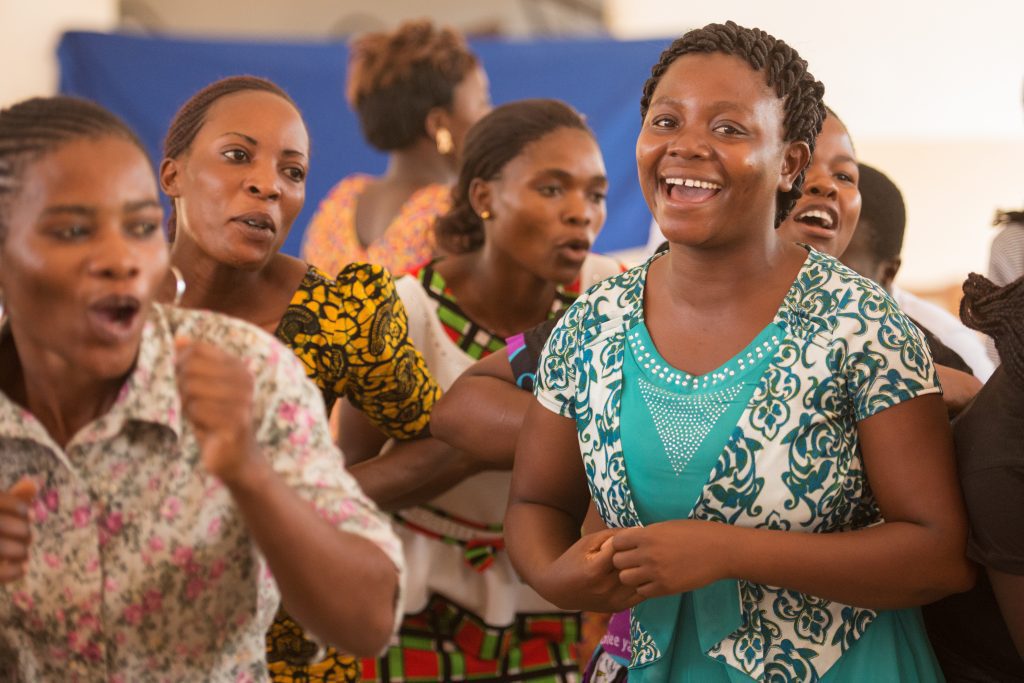
Stumai (right) and her sisters in the CAMFED Association dancing during a Learner Guide review meeting. (Credit: Daniel Hayduk/CAMFED)
Importantly, as Stumai’s story illustrates so powerfully, all the support is delivered within the government school system, and in partnership with school, community and ministry structures. Ownership rests with communities and their representatives, and the young women become part of the structures that once supported them: joining Parent Support Groups and Community Development Committees, working alongside District Education Officials, and returning to their schools as fully qualified teachers.
Lessons from our journey
No program will be successful or sustainable without deep and respectful community engagement.
The GEC’s investment was central to developing and delivering CAMFED’s wider organisational strategy, with sustainability a its core. There are three characteristics of our approach that stand out for Stumai and me as being vital to success, and which we’d encourage others to follow:
1. Community engagement and ownership – No program will be successful or sustainable without deep and respectful community engagement. CAMFED Champions are a non-negotiable part of our movement – they are the teachers, parents, traditional authorities and local officials working together with our women leaders and operational staff to actively champion and support the advancement of girls and young women. They select the most vulnerable children for financial support, and participate in every aspect of the program. They feel responsible for the students and celebrate their successes. They are the ‘volunteers’ other organisations bring into communities – donating time, skills and additional funding to support many more students: building school infrastructure, cooking school meals from their own harvests, and raising funds to buy school supplies. Since 2005 (the year CAMFED was founded in Tanzania), 574,131 students have been supported to go to primary and secondary school through community initiatives in Tanzania.
2. Program implementation in partnership with the government – In order to reach the most marginalized and scale innovations (like the Learner Guide program) it’s vital to support the ambitions of the government to make sure that every child is educated. Don’t duplicate structures and don’t set up competing systems. CAMFED establishes its programs by invitation of the government, and makes sure that the people responsible for education at district and national levels become an intricate part of the program structure, overseeing implementation, advising on what works and what doesn’t, monitoring programs and following up where decisions are made, working with young women graduates of the programs.
For example, when the Tanzanian government changed its policy and actively encouraged school re-entry for young mothers, we had the infrastructure to trace the girls who were pushed out of school due to pregnancy, using Teacher Mentors and Community Development Committees (CDCs), who were able to share lists with CAMFED. This allowed us to then follow up with girls, including through home visits by members of the CAMFED Association, and continue school-going support. CDCs meet quarterly to provide updates, discuss lessons, learners, and continually improve programs. Our programs are also discussed in District Plans, and monitored when district education officers visit schools. Schools will report, for example, if a Learner Guide had to leave their position for personal reasons, so that CAMFED can provide a replacement. Equally, it is extremely important to have government champions at national level, where policy decisions are being made. CAMFED concludes a Memorandum of Understanding with national governments, which includes items like the integration of our My Better World life skills and wellbeing curriculum, delivered by Learner Guides, into the school timetable.
3. Youth involvement and leadership – Put structures, policies and procedures in place that enable young people to take charge. The young people we serve are our clients, and they become our leaders, firmly embedded in every aspect of program delivery. They don’t see themselves just as recipients of aid – they are intent on using what they have received to benefit more young people. Our leadership network, the CAMFED Association, like our CAMFED Champions, is one of the three pillars that make up our movement. Members of the Association sign up to a Constitution and elect their leadership from community to national level. They hold regular meetings and stay connected across the continent, and the world. Members’ lived experience and expertise is CAMFED’s superpower; it’s what makes the model so sustainable. The young women’s motivation to lead, and to support more children to go to school, is unstoppable, and the driver of systems change.
Just look at Stumai, whose life was transformed from hopeless isolation to girls’ education expert and advocate, who is now informing and inspiring members of parliament, as we work on scaling the programs developed under the GEC to benefit every child in Tanzania.
The road ahead
Alongside the GEC-T project, CAMFED took part in a Real-time Scaling Lab partnership with the Center for Universal Education at Brookings. Through this partnership we were able to bring together government and non-government actors in exploring ways to embed and scale the Learner Guide program within the government education system – generating new levels of government buy-in. Stumai has been a key advocate in this partnership, deeply involved in lobbying for the BTEC certification of Learner Guides in Morogoro (she herself earned a BTEC through her work), and initiating conversations with the Regional Commissioner’s Office about extending the program to two districts in Morogoro where CAMFED is not currently working.
In 2021 CAMFED started a new collaboration with the Global Partnership for Education Knowledge and Innovation Exchange (GPE KIX), a joint endeavour with the International Development Research Centre (IDRC), on a participatory research project on government scaling. This project will draw on learnings from GEC-T and our Real-time Scaling Lab partnership, examining how the governments of Tanzania, Zambia, and Zimbabwe can adopt and sustainably scale core elements of the Learner Guide Program partnership.
The seeds of the life skills I have planted will come to fruition.
Stumai still lives with and cares for her mother, supplying her with food and medication. She has even built a house for her, paying a massive dividend on that corrugated sheet metal her mother sacrificed to keep her in school. When I ask her where she sees herself in five years time, she doesn’t look inward, she sees the young people whose lives she has helped to transform: “In five years to come, I see a number of people – boys and girls – changing through me. The seed of the life skills I have planted will come to fruition.” And when I ask her what she wants to tell the world, she says, “I want the world to know that educating the girl is educating the whole community – once a girl is educated, she can take care of herself, her family, her community and her nation. Everyone should support women in leadership positions; they need to be at the table, making decisions for the family, for the nation, and ultimately for our collective future.”
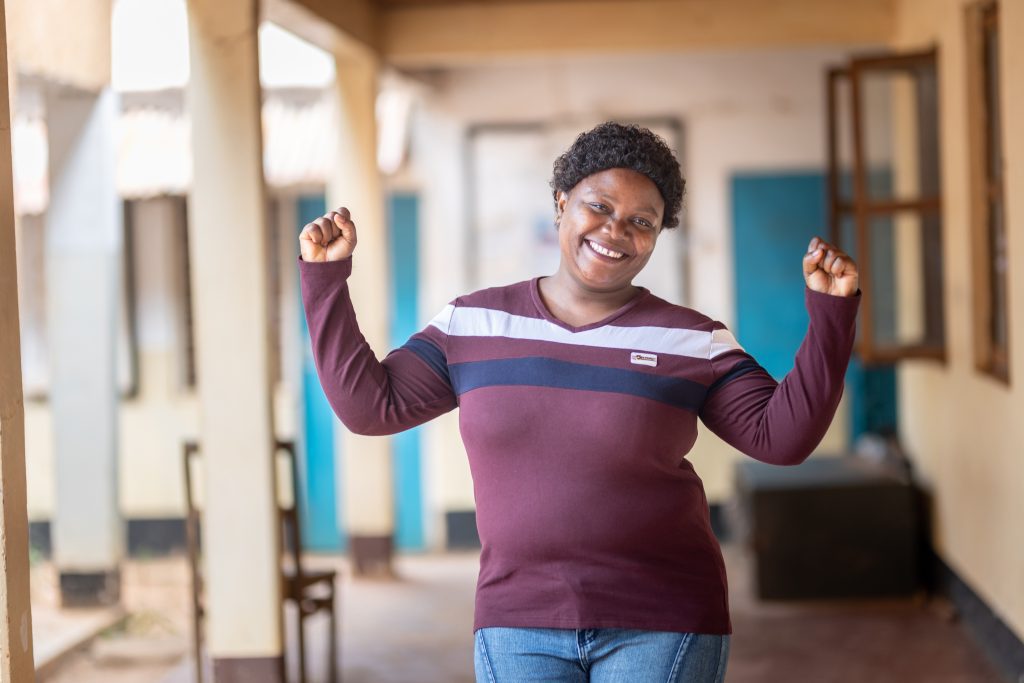
Stumai possesses unrelenting commitment to vulnerable children in her community, and is a bold leader of positive change. (Credit: Kumi Media)
(1) By the end of 2016, 3,820 Learner Guides had been trained by CAMFED across Zimbabwe and Tanzania. Five years on, a total of 8,229 had been trained across Zambia, Zimbabwe and Tanzania, reaching 277,854 girls.
(2) CAMFED: An Unprecedented Uplift in Learning Outcomes (December 12,2016) Available at: https://camfed.org/unprecedented-uplift-in-learning-outcomes/, Accessed 24 August 2022.
(3) Research for Equitable Access and Learning (REAL) Centre, University of Cambridge: Cost-effectiveness with equity: Raising learning for marginalised girls through Camfed’s
programme in Tanzania (January 2018) Available at: https://www.educ.cam.ac.uk/centres/real/downloads/REAL%20Policy%20Brief%20Cost-effectiveness%20Camfed%20A4_FINAL.pdf, Accessed 24 August 2022.
